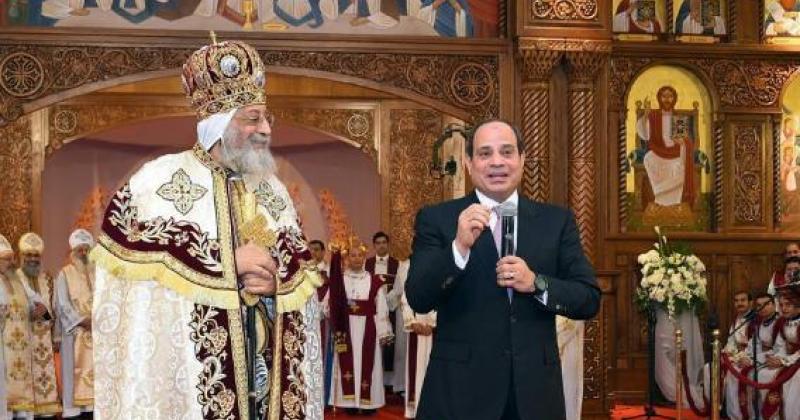The Egyptian president intervened at the Coptic Christmas Eve Mass, to show the strong bond that in this historic moment, strengthens the largest Christian community to the Middle East and to Egypt's current strong man.
****
“We love you, we are with you President, long live Egypt”. So the Copts shouted yesterday evening, during the Christmas Eve mass, while President Abdel Fattah Sisi, flanked by Patriarch Tawadros, walked down the nave of the new Cathedral of the Nativity, built in record time in what will be Egypt’s new administrative capital. When he reached the altar, the Head of State exchanged the expressions of affection received from the faithful, "We too" Sisi said, "love you. You are our people, we are one family, nobody can divide us. We cannot be divided. God is glad that we bring happiness everywhere, to all Egyptians, without exclusions... As long as Egypt is this, those who want to put us against each other will not succeed". After the speech, al Sisi left the Cathedral, always accompanied by the Coptic Pope, while the bells of the cathedral rang, and believers sang the hymns of the Christmas liturgy.
Sisi’s intervention at the Coptic Christmas liturgy, broadcasted live on national TV, wanted to show his country and the world, the strong bond that, in this historical moment strengthens the largest Christian community in the Middle East and the current strong man of Egypt. Al Sisi is the first Egyptian President to have physically taken part in the liturgical solemnity of the Copts, and yesterday he did so for the fourth time. His political project defines the Coptic component as an essential and non-excludable element of the Egyptian identity. In July 2016, he announced that he wanted to increase penalties for those fomenting sectarian riots and violence. On 30 August 2016, the Egyptian Parliament voted the new law on the construction of churches, eliminating bureaucratic limits and obstacles that for decades had heavily conditioned the ordinary life of Egyptian Christian communities.
The cathedral, which inaugurated last night, also represents a symbol of the political strategy with which Al Sisi is tying the Coptic Church to himself and his political project. On 7 January 2017, while attending the Coptic liturgy of last Christmas, it was Egyptian President Sisi himself who announced that the new cathedral of the future administrative capital would be inaugurated for Coptic Christmas 2018. The army's workers and engineers have been working full speed to ensure al Sisi’s promise. The construction of the new cathedral, which is still to be completed, has been directly sponsored by the Egyptian Presidency, which has funded £100,000 Egyptian pounds for the initiative. "Now - the Egyptian leader said in his speech on Christmas Eve - this new worship site represents "a message for Egypt and the whole world".
The Egyptian media continue to present the cathedral, dedicated to the Nativity of Jesus, as "the largest church in the Middle East". The architectural design of the cathedral, following the Coptic tradition, aims to recall Noah's Ark, and thus propose the image of the Church as a "boat" of salvation that navigates through the events and convulsions of history towards heaven.
The urban planning project for the new administrative capital, 45 kilometres east of Cairo, includes the simultaneous construction of the country's largest mosque, with the intention of presenting both the cathedral and mosque as symbols of coexistence and national unity.
The Christmas liturgy, with the participation of al Sisi and other high political and military representatives, took place among daunting security measures. The jihadist campaign of terrorism is fierce against the Copts for one of their political objective is to reignite anti-Copt sectarian impulses amid Islamist groups, and destabilizing in this way the power of al Sisi. This year, according to official sources, the Ministry of Interior deployed 230,000 security staff to monitor the peaceful running of Christmas liturgies in churches throughout the country. The churches, where it was possible, had to install surveillance cameras and electronic gates, setting up control systems in collaboration with the army and police.
